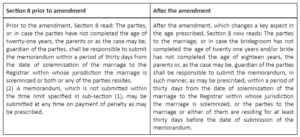In news- Recently, a Bill passed last month by the Rajasthan Assembly, which amended a 2009 law on mandatory registration of marriages, including child marriages, has been embroiled in controversy.
Key amendments-
Following are the amendments proposed under the Rajasthan Compulsory Registration of Marriages (Amendment) Bill, 2021:
- The bill amends Section 8 of the Rajasthan Compulsory Registration of Marriages Act, 2009, which deals with “Duty to submit Memorandum”.
- The Act itself defines Memorandum as the “Memorandum for registration of marriage.”

- Sub-section 2 has been amended to permit eligible parties — even if one or both are deceased — to submit the memorandum.
- But even prior to the amendment, registration of child marriages was compulsory under Section 8.
- The amendment only restricts its scope to women till the age of 18.
- It authorises women above 18 years to provide information of their marriage on their own.
- The Amendment Bill had been brought in accordance with a 2006 judgment of the Supreme Court making it compulsory to register all marriages of Indian citizens.
Criticisms of the bill-
- Critics say compulsory registration of child marriage would legitimise it.
- Activists have also said the marriage certificate might in fact, contrary to government claims, become a hurdle in getting an annulment later as courts could cite lack of a marriage certificate as a reason to not grant an annulment.
The Prohibition of Child Marriage Act-2006-
- It prohibits solemnization of marriage of a boy who is less than 21 years of age arid a girl who is less than 18 years of age.
- It allows a child marriage to be annulled by either the bride or the groom who was a minor at the time of marriage when they attain the age of majority.
- So essentially, it gives them an option to roll back the marriage as if it never happened.
Punishment under the Act
- Under Section 9, Prohibition of the Child Marriage Act, male adults shall be punished with imprisonment up to two years and/or a fine of Rs 1 lakh for marrying a minor girl. Under
- Section 10 says whoever performs, conducts, directs or abets any child marriage shall be punishable with rigorous imprisonment which may extend to two years and shall be liable to fine which may extend to one lakh rupees unless he proves that he had reasons to believe that the marriage was not a child marriage.
- This enables the police to arrest not just the adult groom or parents facilitating a child marriage, but anyone who participates in solemnising such a marriage.
Supreme Court on Child marriages & its registration
- In Independent Thought vs Union of India (2017), the Supreme Court refused to extend the protection of marital rape to child marriages.
- The court held that intercourse with a minor girl, even under marriage, would amount to rape. While marital rape is not punished under the law, intercourse with a minor is considered rape.
- In Seema v Ashwini Kumar (2006), the Supreme Court ruled that registration of marriage must be made compulsory. Some states such as Karnataka and Uttarakhand have similar provisions for registering and recording child marriages.
- In 2019, the Kerala High Court also ruled that there is no bar in the law to register a child marriage, upholding a 2008 government circular framing rules for such registration.
















